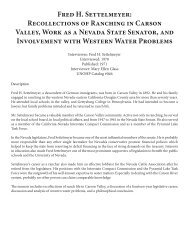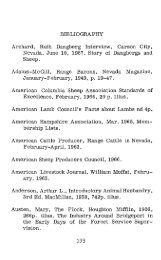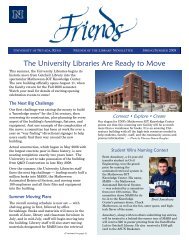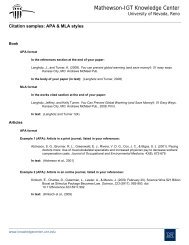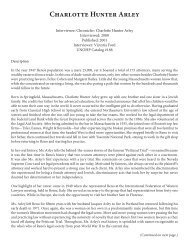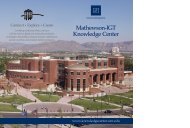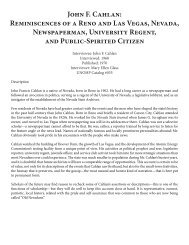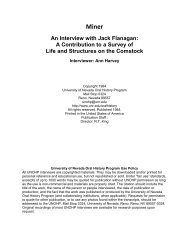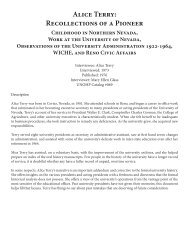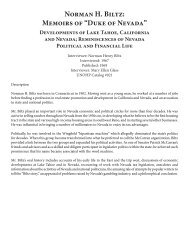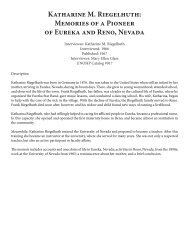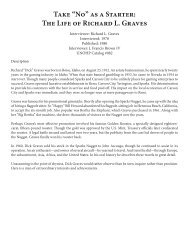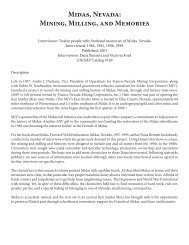Silvio Petricciani - University of Nevada, Reno
Silvio Petricciani - University of Nevada, Reno
Silvio Petricciani - University of Nevada, Reno
You also want an ePaper? Increase the reach of your titles
YUMPU automatically turns print PDFs into web optimized ePapers that Google loves.
26 <strong>Silvio</strong> E. <strong>Petricciani</strong><br />
I know nothing <strong>of</strong> him to—I really couldn’t<br />
say anything about him at all. I just vaguely<br />
remember the name. If anything, he was in the<br />
background, completely in the background.<br />
Let’s see—now Warren Nelson—Warren<br />
Nelson came into <strong>Reno</strong> in 1936 and there’s a<br />
little history as to how he got to <strong>Reno</strong>. Warren<br />
was living in Great Falls, Montana; and we<br />
had a gentleman here by the name <strong>of</strong> Francis<br />
Lyden who approached my father about<br />
putting—at that time we called it Racehorse<br />
Keno and now it’s called Keno—but putting<br />
Keno in the Palace Club. So my dad listened<br />
to it and to his proposition and decided it<br />
was all right.<br />
However, there was a problem ins<strong>of</strong>ar as<br />
Keno that it might be considered a lottery.<br />
And my dad went to Carson City and had a<br />
talk with the governor at that time [Richard<br />
Kirman, Sr.] and the powers that be; it was<br />
decided that Keno could be operated in the<br />
state <strong>of</strong> <strong>Nevada</strong> and would not be deemed<br />
a lottery because <strong>Nevada</strong> has a law against<br />
lotteries. So they deemed that it would not be<br />
classified as a lottery, so Francis Lyden brought<br />
in—there were no experienced Keno writers<br />
or anything—so Francis Lyden went back to<br />
Montana and brought in several experienced<br />
Keno people. And Warren happened to be<br />
one <strong>of</strong> them. And Warren Nelson got his start<br />
right here in the Palace Club as a Keno writer.<br />
And he subsequently married my sister, and<br />
then they were divorced. And Warren went<br />
on about his business in town. And so my dad<br />
leased the place out, and somehow or other<br />
Warren got in here on a one or two percent<br />
partnership which was not supposed to be,<br />
but he did. And he was in here until nineteen,<br />
oh, about 1962 or ’63. I forget when they<br />
opened the Cal-Neva, but he left the Palace<br />
Club at that time, and they bought him out.<br />
And he went into partnership in the Cal-Neva<br />
then on Second Street.<br />
And I might add right now that the Palace<br />
Club was the original home <strong>of</strong> Keno. It was the<br />
first Keno in the state <strong>of</strong> <strong>Nevada</strong>, and I guess<br />
that’s so much for Warren Nelson. The rest is<br />
history as far as he’s concerned.<br />
How long was he here at the Palace Club?<br />
Oh, he was here in the Palace until 1942,<br />
I believe, and he went into the Marine Corps<br />
at that time.<br />
And as I said, Jack Douglass and Bill<br />
Fong I didn’t know at that time. I just couldn’t<br />
make any observations on those two people<br />
at all, other than Jack Douglass went into<br />
partnership with Warren and a few other<br />
people down at the Cal-Neva Club. Jack was<br />
around town for a long time here. He was in<br />
the restaurant business I believe with Leon<br />
Nightingale, restaurant and bar business with<br />
Leon Nightingale, which is another partner in<br />
the [Cal-Neva Club].<br />
Why is Keno not considered a lottery?<br />
What is different about it is in the way<br />
that it’s interpreted in the federal laws, and<br />
gaming— (now this pertains to all games)<br />
and that is how it’s worded, and you can go<br />
back and find it. The bets must be placed, the<br />
winners determined, and all winners must be<br />
paid <strong>of</strong>f in the presence <strong>of</strong> all other players<br />
participating in the game. So consequently<br />
a lottery is a game whereby people can make<br />
a bet like on—well, let’s say it’s going to be<br />
a lottery. The racetrack itself is a lottery. I’ll<br />
tell you why, because they take in a certain<br />
amount <strong>of</strong> money, right? They tabulate this<br />
amount <strong>of</strong> money, and they allot so much to<br />
prizes, so much to overhead, and so much<br />
to pr<strong>of</strong>it. So you see the people themselves<br />
are, in effect, the whole amount <strong>of</strong> people<br />
playing are paying for the winners, right?



